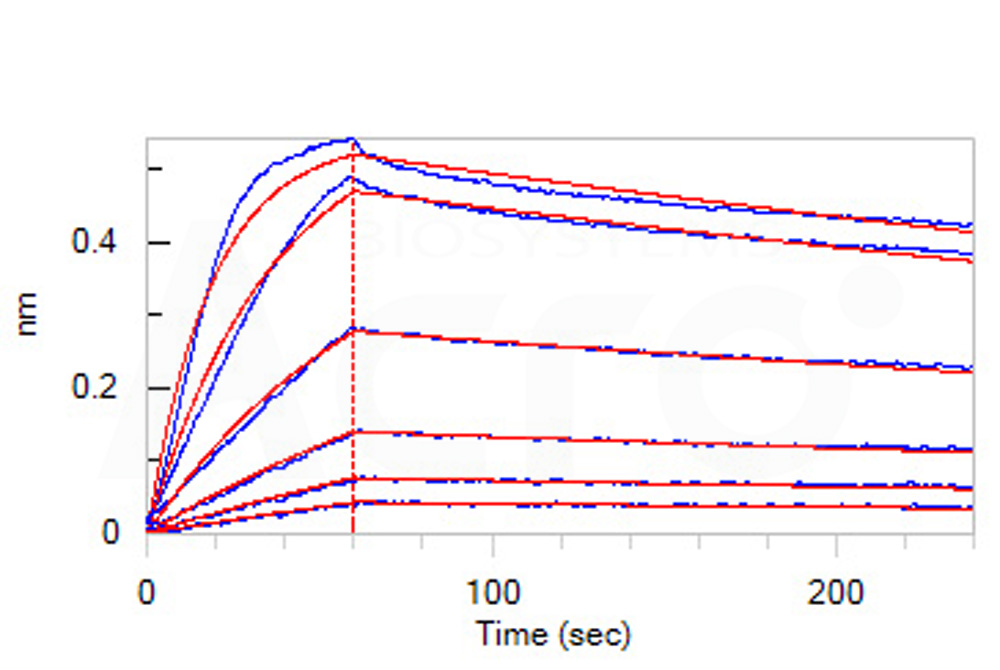分子别名(Synonym)
CCN2,NOV2,HCS24,IGFBP8,IBP-8,IGFBP-8,IGF-binding protein 8
表达区间及表达系统(Source)
Mouse CTGF, His Tag (CTF-M52Hc) is expressed from human 293 cells (HEK293). It contains AA Gln 26 - Ala 348 (Accession # P29268-1).
Predicted N-terminus: Gln 26
Request for sequence
蛋白结构(Molecular Characterization)

This protein carries a polyhistidine tag at the C-terminus
The protein has a calculated MW of 37.3 kDa. The protein migrates as 37-40 kDa under reducing (R) condition (SDS-PAGE) due to glycosylation.
内毒素(Endotoxin)
Less than 1.0 EU per μg by the LAL method.
纯度(Purity)
>90% as determined by SDS-PAGE.
制剂(Formulation)
Lyophilized from 0.22 μm filtered solution in Tris with Potassium glutamate and Arginine, pH7.0 with trehalose as protectant.
Contact us for customized product form or formulation.
重构方法(Reconstitution)
Please see Certificate of Analysis for specific instructions.
For best performance, we strongly recommend you to follow the reconstitution protocol provided in the CoA.
存储(Storage)
For long term storage, the product should be stored at lyophilized state at -20°C or lower.
Please avoid repeated freeze-thaw cycles.
This product is stable after storage at:
- -20°C to -70°C for 12 months in lyophilized state;
- -70°C for 3 months under sterile conditions after reconstitution.
电泳(SDS-PAGE)

Mouse CTGF, His Tag on SDS-PAGE under reducing (R) condition. The gel was stained with Coomassie Blue. The purity of the protein is greater than 90%.
活性(Bioactivity)-ELISA

Immobilized Mouse CTGF, His Tag (Cat. No. CTF-M52Hc) at 2 μg/mL (100 μL/well) can bind Monoclonal Anti-Human CTGF Antibody, Human IgG1 with a linear range of 0.3-5 ng/mL (QC tested).
Protocol
活性(Bioactivity)-BLI

Loaded Monoclonal Anti-Human CTGF Antibody, Human IgG1 on AHC Biosensor, can bind Mouse CTGF, His Tag (Cat. No. CTF-M52Hc) with an affinity constant of 2.46 nM as determined in BLI assay (ForteBio Octet Red96e) (Routinely tested).
Protocol
背景(Background)
Connective Tissue Growth Factor (CTGF), also known as CCN2, is a member of the CCN (CCN1-6) family of modular matricellular proteins. Like other CCN proteins, mature human CTGF consists of IGF-binding protein domain, a vWF-C domain, a TSP-1 domain, and a cysteine knot heparin-binding domain. CTGF promotes proliferation and differentiation of chondrocytes. Mediates heparin- and divalent cation-dependent cell adhesion in many cell types including fibroblasts, myofibroblasts, endothelial and epithelial cells. Enhances fibroblast growth factor-induced DNA synthesis. Analysis of CCN2 function in vivo has focused primarily on its key role as a mediator of excess ECM synthesis in multiple fibrotic diseases.























































 膜杰作
膜杰作 Star Staining
Star Staining











